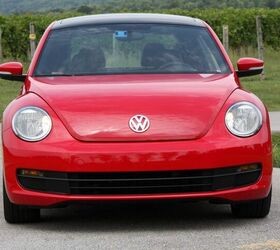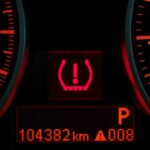The 2012 Volkswagen Beetle marked a significant departure from its “New Beetle” predecessor, aiming for a broader appeal beyond its traditionally female-dominated fanbase. As highlighted in initial reviews, the redesign focused on a more masculine aesthetic and improved driving dynamics. However, under the hood, the engine remained a critical aspect of its identity and performance. This article delves into the engine options available for the 2012 Volkswagen Beetle, exploring their capabilities and overall reliability.
The original review of the 2012 Beetle raised pertinent questions about its market viability. The author’s passenger, a “Straight-Shooting Self-Styled Marketing Expert,” questioned the car’s appeal, suggesting the previous generation was primarily bought by an aging demographic. This new Beetle needed to offer more, and a key component of that “more” was its powertrain.
Volkswagen, known for its platform sharing and evolutionary design approach, built the 2012 Beetle on a more contemporary platform, moving away from the older Mk IV A-platform that underpinned the New Beetle. This shift promised improvements in various areas, including the engine offerings and their integration within the vehicle.
Engine Options for the 2012 Beetle: A Detailed Look
For the 2012 model year in the North American market, the Volkswagen Beetle primarily offered two engine choices: a naturally aspirated 2.5-liter five-cylinder engine and a turbocharged 2.0-liter four-cylinder engine. Each engine catered to different driving preferences and performance expectations.
The 2.5-Liter Five-Cylinder Engine
The standard engine for the 2012 Beetle was a 2.5-liter inline five-cylinder. This engine, while not the most cutting-edge in terms of technology, was known for its smooth operation and adequate power delivery for everyday driving. It produced around 170 horsepower and 177 lb-ft of torque.
As the review mentions, the test vehicle was equipped with this 2.5-liter engine and a six-speed automatic transmission. The reviewer noted that this combination was “prosaic” but “proven.” The engine and transmission were geared towards fuel efficiency, sometimes resulting in low RPM cruising speeds, which might not appeal to drivers seeking spirited performance.
The 2.0-Liter TSI Turbo Engine
For those desiring more dynamic performance, Volkswagen offered a 2.0-liter TSI turbocharged four-cylinder engine in the 2012 Beetle Turbo model. This engine was a significant step up in terms of power and responsiveness. It delivered around 200 horsepower and 207 lb-ft of torque, offering a noticeable increase in acceleration and overall driving excitement.
While the original article mentions a separate review for the Beetle Turbo, it hints at the improved handling and performance capabilities associated with the turbocharged engine. This engine was designed to provide a more engaging driving experience, aligning with the desire to attract a broader range of buyers, including those who prioritize performance.
Performance and Driving Experience
The choice of engine significantly impacted the driving experience of the 2012 Volkswagen Beetle.
2.5-Liter Five-Cylinder: This engine provided sufficient power for daily commutes and comfortable cruising. It prioritized smoothness and fuel economy over outright acceleration. The six-speed automatic transmission, as noted in the review, was tuned for lower shift points to enhance fuel efficiency, sometimes at the expense of immediate responsiveness. Drivers looking for relaxed and predictable performance would find this engine suitable.
2.0-Liter TSI Turbo: The turbocharged engine transformed the Beetle’s character. It offered quicker acceleration, more assertive passing power, and an overall more engaging driving experience. The increased torque and horsepower made the Beetle Turbo feel significantly more agile and responsive, aligning it more closely with sporty compact cars. While specific 0-60 mph times are not detailed in the original review for both engine types, the subjective assessment clearly indicates a performance advantage for the turbo engine.
Engine Reliability and Maintenance
The Mk IV platform Volkswagens, which preceded the 2012 Beetle, had a reputation for some reliability issues, as pointed out in the original article. Volkswagen aimed to address these concerns with the newer platform and engine designs in the 2012 Beetle.
2.5-Liter Five-Cylinder Reliability: The 2.5-liter five-cylinder engine, while not particularly advanced, was generally considered to be reasonably reliable. It was a naturally aspirated engine, meaning it had fewer components compared to a turbocharged engine, potentially contributing to better long-term reliability. Routine maintenance, such as oil changes and filter replacements, was essential to keep this engine running smoothly.
2.0-Liter TSI Turbo Reliability: The 2.0-liter TSI engine, part of Volkswagen’s EA888 engine family, was a more complex engine incorporating turbocharging and direct injection. Early versions of EA888 engines were known to have some issues, including timing chain tensioner problems and carbon buildup in direct injection systems. However, by 2012, Volkswagen had addressed many of these initial concerns. Regular maintenance, including timely oil changes with high-quality synthetic oil, was crucial for the longevity of the 2.0T engine.
Choosing the Right Engine for Your 2012 Beetle
The decision between the 2.5-liter and 2.0-liter TSI engine for a 2012 Volkswagen Beetle depended largely on individual driving needs and preferences.
-
Choose the 2.5-liter engine if: You prioritize smooth, comfortable daily driving, fuel efficiency is a key concern, and you prefer a more relaxed driving experience. Reliability and potentially lower maintenance costs might also be factors favoring the 2.5L engine.
-
Choose the 2.0-liter TSI engine if: You desire more engaging and spirited performance, enjoy quicker acceleration and a more responsive driving feel, and are willing to potentially undertake slightly more involved maintenance associated with a turbocharged engine.
Ultimately, both engine options offered for the 2012 Volkswagen Beetle provided distinct driving experiences. The 2.5-liter engine catered to practicality and everyday usability, while the 2.0-liter TSI engine injected a dose of sportiness into the Beetle’s retro design. Understanding the characteristics of each 2012 Volkswagen Beetle Engine is crucial for prospective buyers to make an informed decision and find the model that best suits their needs.

